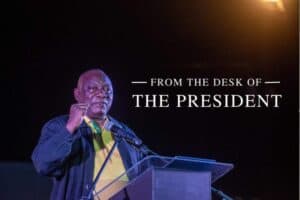The 2019 Indlulamithi barometer showed SA was being 'pulled' between the gwara gwara and iSbhujwa scenarios.

The main driving forces that will shape SA are resistance, resentment and reconciliation (RRR), along with social inequality, institutional and leadership capacity, according to research by Indlulamithi South Africa Scenarios 2030, a multi-stakeholder research-driven initiative.
The initiative was launched in June 2018 to provide tools in the form of scenarios to focus leaders from different sectors and people from all walks of life on a key question: what would a socially cohesive SA look like?
Indlulamithi project management director Xolelwa Kashe-Katiya said according to the aggregate, the 2019 Indlulamithi barometer showed SA was being “pulled” between the gwara gwara and iSbhujwa scenarios.
iSbhujwa epitomised a loose-limbed, jumpy nation, with a frenetic edge, torn by deepening social divides, daily protests and cynical self-interest.
The gwara gwara scenario is a nation torn between immobility and restless energy and embodies a demoralised land lawlessness.
Kashe-Katiya said: “Although iSbhujwa scenario was dominant when considering resistance, resentment, reconciliation and institutional capacity and leadership dimensions, the gwara gwara was more dominant overall because it is so strong in the social inequality dimension.”
Indlulamithi, a Nguni name for giraffe, is a project aimed encouraging big-picture and far-horizons thinking by providing tools, research, facilitated workshops, downloadable presentations and booklets to assist South Africans to imagine alternative futures more than a decade from today.
“These scenarios aim to focus leaders from different sectors and people from all walks of life on the key questions of: what would a socially cohesive SA look like? And to what degree is this attainable by 2030,” according to the report.
The project is led by professor Somadoda Fikeni and is supported by a group of diverse stakeholders from government, labour, civil society and business.
The initiative is a response to the reality that, despite great progress over the past two decades, SA still faces major challenges.
“As a nation we are struggling to deal with a confluence of inadequate economic growth, widespread unemployment, sharp inequalities, low levels of fixed investment and frail levels of social capital. Cumulatively, these have a major impact on the living standards, safety, education and health of our people,” the report reads.
The year 2030 was chosen to coincide with the National Development Plan timelines as well as those of the United Nation’s Sustainable Development Goals.
It also covers three national election cycles in SA – 2019, 2024 and 2029 – and two local government election cycles – 2021 and 2026.
For more news your way, download The Citizen’s app for iOS and Android.
Support Local Journalism
Add The Citizen as a Preferred Source on Google and follow us on Google News to see more of our trusted reporting in Google News and Top Stories.






